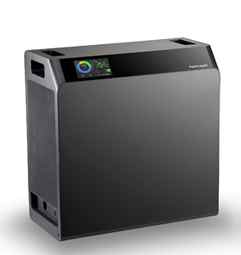Electricity retailing giant AGL Energy has taken the industry by surprise by offering 7.2kWh battery storage systems at under less than $10,000 each – in what appears to be a massive discount over prevailing wholesale prices, let alone retail prices.
The offering of the 7.2kWh Powerlegato battery system from its Taiwanese partner AU Optronics was made via its Power Advantage Club, a network established when AGL became the first of the major utilities to announce it was about to roll out a battery storage product to its consumers.
 According to the email sent to club members, the battery storage system will be available in South Australia, Victoria and NSW, as well as Queensland. The price includes an inverter, control system, and “basic installation”, including connection to an existing rooftop solar system.
According to the email sent to club members, the battery storage system will be available in South Australia, Victoria and NSW, as well as Queensland. The price includes an inverter, control system, and “basic installation”, including connection to an existing rooftop solar system.
The price is less than one third of that offered for the same battery storage system to wholesalers, which, as we reported here in our story Tesla already forcing down price of battery storage, was already a one-third cut from the price offered for similar battery storage applications just six months earlier.
The AGL pricing means that the cost of battery storage has fallen by more than half in just six months. As one analyst noted: “Either they are getting a huge discount for volume orders, or they are doing a loss leader (or both!).”
But there could be method in their madness, if that is what it is. Customers need to pay for the system upfront, as there is no finance. They also have to lock in for a long term contract with the retailer, so it seems that AGL is willing to offset upfront losses for long-term gains.
Also, given the current tariff structures, AGL is more likely to benefit from any network and tariff advantages from the battery storage system than the customer.
The AGL offering also includes rewiring of one household circuit so that it will be backed-up by the battery storage system, and the set up of the battery monitoring software.
AGL Energy says it is targeting the “early adopter” market of home energy “front-runner”, and doesn’t believe that battery storage will come down to “mass market” prices until after 2020.
However, there is considerable debate about this. Many smaller firms believe the mass market price point will arrive much earlier than that, prompted by the Tesla battery storage offering and matching price offerings from its competitors.
Analysts are also curious why, in some cases, basic battery storage systems can be bought in China for around $150/kWh but then marked up to $1,000kWh when sold in Australia. The additional of a battery management system will put the price up, but not to this extent.
“That’s a ton(ne) of markup,” said another analyst.

It makes some expect that the cost of battery storage could fall dramatically, in the same way that rooftop solar panels fell sharply seven years ago as the mass market and its associated dynamics took hold.
This graph above, from Credit Suisse, indicates what happened and how a market known for high prices and high margins quickly transformed into a low price, low margin commodity. The Tesla gigafactory may just be a prompt for a similar trajectory in battery storage.
Giles Parkinson is founder and editor of One Step Off The Grid, and also edits and founded Renew Economy and The Driven. He has been a journalist for 35 years and is a former business and deputy editor of the Australian Financial Review.


